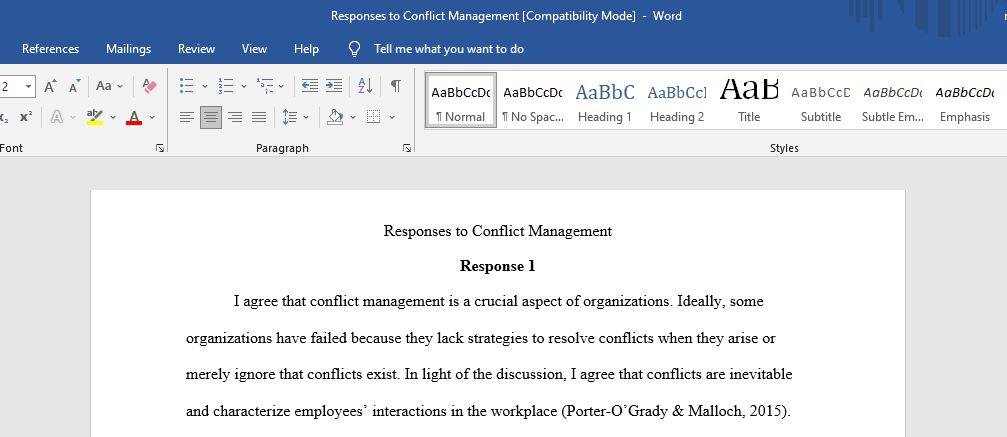Ways Biblical Worldview Guides Leadership Roles in Conflict Management
Conflict is a common occurrence within all organizations and should not be avoided. It is considered a normal reaction with human relationships and should be accepted as a possibility for change or recognizing a different perspective. When conflict is not addressed, the concern only grows and develops into a complicated situation. “Because it is normal for almost all human interactions when left unaddressed, conflict simply changes its form and emerge somewhere in a kind of wolf in sheep clothing” ( Porter-O’Grady & Malloch, 2015, p. 205). Christian health administrators should be concerned when conflict occurs because it may delay growth and affect the operations of the organization.
Active listening and interactions from administrators will create an atmosphere of openness and allow the release of inhibitions to discuss the conflict—human nature presents conflict through a variety of opinions, and when leadership is not visible. Sometimes the dispute is created when personnel feels no one is listening, and their concern is not essential. Christian health administrators know that all people matter in God’s sight and worth showing their value by listening. The Bible states, “and they could not find what they might do; for the people all hung upon him, listening” (Luke 19:48 ASV). When a crisis evolves, the immediate response is to place blame on each other and not listen, but patience and understanding of our difference will alleviate some conflicts. The administrator that’s willing to welcome diversity and the cultural gap will develop a good relationship with personnel while promoting positivity during the conflict.
Reference:
Porter-O’Grady, T. & Malloch, K., 2015. Quantum Leadership, Burlington, MA. Jones & Bartlett Learning
100 WORD REPLY EITHER AGREEING DISAGREEING OR RELATED TO
Disagreements typically occur among individuals in various contexts and often require appropriate mitigation, particularly if they occur as part of a group involving multiple individuals. Major attributable causes of conflict encompass ignorance and avoidance, and effective strategies are required in managing it. Leaders have numerous roles to play in groups involving individuals, including the application of their conflict resolution skills for the long-term objective of having a team that can work together towards a common goal (Smiley, 2018). Christian worldview encompasses the framework of ideas, beliefs, and practices that governs the code of conduct of leaders in times of crisis and guides their actions.
Among the roles of leaders postulated by the Christian view include not ignoring problems as Godly leaders for the success of the conflict resolution process. The bible requires leaders to acknowledge the presence of issues, and pay close attention to the problems just as Nehemiah in the Holy Scripture did not ignore the prevalent conflict that arose between the nobles and their officials despite having a great project running. According to Zscheile (2012), effective leadership qualities facilitate understanding the dangers of getting involved in the presenting strife and the benefits attributed to resolving it, which, if not effectively mitigated, has a high prospect of spreading. Psalms postulate that a leader’s choice of ignoring conflict results in the removal of God’s blessings from the people as He cannot bless a community if discord, He is a God of harmony.
The Christian worldview also postulates that Godly leaders need to develop a wave of righteous anger for effective conflict resolution. Psalms present God as a righteous judge, whose wrath is expressed daily, hence justify the need to sometimes being responsibly angry, just as Jesus was when he found people trading in the temple and followed appropriate requisite action that benefited of all.
References
Smiley, F. (2018). Leadership Guide to Conflict and Conflict Management. Leadership in Healthcare and Public Health.
Zscheile, D. J. (2012). Christian biblical understandings of leadership. Religious Leadership: A Reference Handbook, 153-160. https://doi.org/10.4135/9781452276137.n24
100 WORD REPLY EITHER AGREEING DISAGREEING OR RELATING TO

word limit:239
